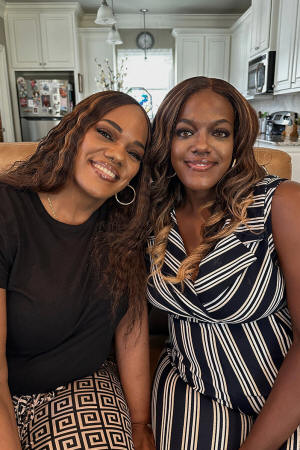Daughter says mom 'gave me life twice' with kidney donation as pair
graduate nursing school together
[May 09, 2025]
By SARA CLINE and STEPHEN SMITH
BATON ROUGE, La. (AP) — For years, Ambrealle Brown was forced to put her
dreams of becoming a nurse on hold due to a life-threatening kidney
disease that left her temporarily incapacitated.
Amid inner doubts about whether she would ever return to living a normal
life, Brown's mother stepped in and offered to donate her kidney.
Doctors performed Louisiana's first robotic kidney transplant, giving
Brown a renewed chance at life and Nija Butler the opportunity to see
her daughter thrive.
Nearly two years after the successful transplant, the Louisiana mother
and daughter shared another journey. Donning white caps and gowns, they
walked across the stage together in Baton Rouge and graduated from
nursing school.
“As parents, we always tell our children, we would die for you, and kids
don’t always understand that kind of love,” Butler, 48, said. “I would
have given anything for her to live. I mean that from the bottom of my
heart, without a second thought.”
During an interview with The Associated Press last month, the two women
reflected on their journey together and the challenges they have
overcome.
The Louisiana mother-daughter duo has always been close. Butler gave
birth to her daughter when she was in high school, and as a result, they
grew up together. Butler poured herself into raising her daughter and
son, and Brown planned to become a nurse.
But in 2016, when Brown was diagnosed with Focal Segmental
Glomerulosclerosis (FSGS), a rare kidney disease that can cause kidney
failure, everything changed. Her prognosis quickly worsened. One day,
Brown, who was taking prerequisite courses for nursing school, felt her
legs tighten to the point that she could not move.
Shortly after, Brown's doctor delivered detrimental news: Brown would
either need to start dialysis or have a kidney transplant to survive.
The average wait for a kidney transplant in the U.S. can vary from two
to five years, or longer, depending on certain factors, based on data
from the National Kidney Foundation.

Brown desperately hoped for a new kidney. But as she awaited news of a
transplant, she was forced to turn to dialysis — a treatment that lasted
nine to 13 hours, every single day. Brown's daily life was limited, and
she had to stop school.
After years of dialysis, Butler said she saw a shift in her daughter,
who was typically optimistic.
“It was like she wanted to give up,” Butler recalled about a phone call
with her daughter. “She was tired of just being connected to a tube that
her life revolved around.”
[to top of second column]
|

Kidney donor Nija Butler and kidney recipient Ambrealle Brown are
photographed the day before graduating from Baton Rouge General's
School of Nursing on April 28, 2025 in central Louisiana. (AP
Photo/Stephen Smith)
 Although doctors had previously told
Butler she likely wasn't a match to be a kidney donor for her
daughter, she still scheduled an appointment to get tested the next
day. She opted not to tell her daughter, not wanting to get her
hopes up in case it wasn’t a viable match.
Soon after, Brown got news she had been waiting five years to hear —
she was getting a new kidney. She called her mother to tell her, but
her mom already knew. Confused, Brown asked her mother how she would
know that.
“It's me," Butler responded.
The two underwent surgery in March 2023, with Tulane University
School of Medicine doctors performing the state's first kidney
transplant using a robotic surgical system. The practice offers
increased precision so the procedure is minimally invasive, hoping
there will be less pain and a speedier recovery.
After the successful surgery, Brown returned her focus to school.
Her mother decided to get her registered nurse’s license as well.
For 16 months, they were attached at the hip. They sat together,
studied together, and, in April, graduated from the Baton Rouge
General School of Nursing together.
“I couldn’t have done it without her because nursing school is
hard," Brown, 34, said. “I’m happy that I was able to go through
that milestone with her side by side.”
Brown has accepted a job at a burns intensive care unit, and Butler
is continuing her career at a psychiatric facility.
The ladies hope their story inspires others to never give up and
also spread awareness about the importance of medical testing and
the donor and transplant process.
“Thank you for giving me life twice," Brown said to her mother. “I
have to keep saying that because you gave me a second chance at
life, and most people don’t get do-overs.”
Butler wiped away a tear and, without skipping a beat, said, "And I
would do it again.”
All contents © copyright 2025 Associated Press. All rights reserved |